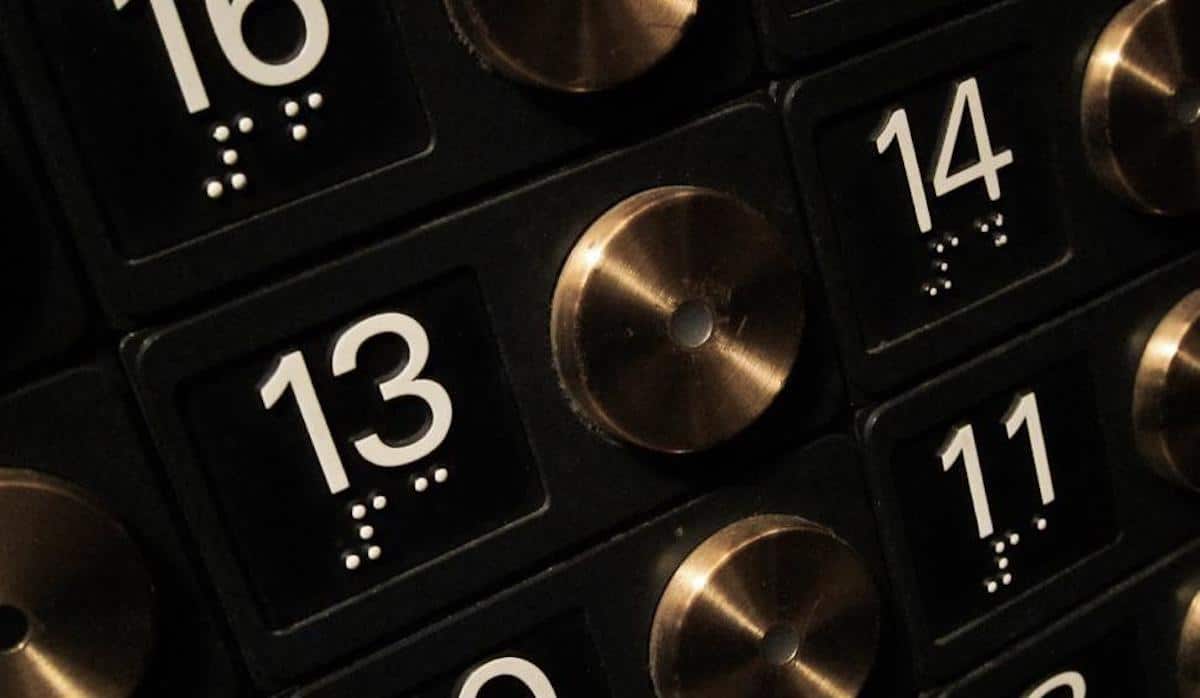Have you ever noticed that many buildings, especially high-rises, seem to skip the 13th floor? It’s a phenomenon that’s puzzled many, leading to whispers of superstition and folklore. While some dismiss it as mere coincidence, the truth is that the absence of a 13th floor is a deliberate choice driven by a deeply rooted fear of the number 13. This fear, known as **triskaidekaphobia**, extends far beyond the realm of building numbering.

Image: viewfloor.co
Growing up in a city filled with skyscrapers, I always found it strange that some buildings would have a 12th floor followed by a 14th floor, skipping the 13th. My curiosity was piqued: was this a bizarre architectural trend or something more sinister lurking beneath the surface? This question, along with an inexplicable fascination with the number 13, sparked a journey into the world of triskaidekaphobia and its influence on building design.
The Origins of Triskaidekaphobia
A Historical Journey into the Fear of the Number 13
The fear of the number 13, triskaidekaphobia, has deep roots in history and culture. It’s believed to have originated in ancient Babylonian mythology, where the 13th moon was associated with an evil deity. Throughout history, unfortunate events and coincidences involving the number 13, like the Friday the 13th myth, solidified its association with bad luck. The Christian tradition further contributed to this fear, as Judas Iscariot, the betrayer of Jesus, was the 13th guest at the Last Supper.
This fear isn’t a mere superstition; it’s a genuine phobia that can cause anxiety, stress, and even physical symptoms. Individuals with triskaidekaphobia often avoid activities or events related to the number 13. This phobia isn’t confined to individuals: it has also manifested in a collective societal fear, as evidenced by the missing 13th floors in buildings.
A Practical Approach: Why Buildings Skip the 13th Floor

Image: infoupdate.org
Addressing the Fear and Keeping Business Running
While the fear of 13th floors is rooted in superstition, building developers and owners understand the reality of triskaidekaphobia and its potential impact on their businesses. Many believe that skipping the 13th floor is a practical approach to appease anxieties and boost building occupancy. The rationale is straightforward: if potential tenants or buyers are superstitious and avoid the 13th floor, it becomes a non-renting or non-selling space, leading to financial losses.
This fear has led to a widespread practice of skipping the 13th floor in buildings. Rather than labeling a floor as the 13th, developers often renumber it as the 14th, avoiding the number altogether. This practice extends beyond residential buildings, including office buildings, hotels, and even hospitals. The goal is to create a feeling of comfort and avoid any potential negative association with the number 13.
Beyond the 13th Floor: Triskaidekaphobia in Modern Society
The Impact of the Fear of 13 on Everyday Life
The fear of the number 13 isn’t limited to the construction industry. It’s a phenomenon that has seeped into various aspects of modern life. You’ll find it reflected in:
- Flight schedules: Some airlines avoid having flights numbered 13.
- Hotel rooms: Many hotels skip room numbers like 13.
- Product design: Companies may avoid using the number 13 on packaging.
This fear creates a ripple effect, shaping decisions in seemingly unrelated fields. From building design to everyday products, the phobia of 13 is a powerful force that can influence consumer behavior and marketing strategies.
Tips for Dealing with Triskaidekaphobia
Breaking Free from the Fear of the Number 13
If you find yourself feeling anxious or stressed around the number 13, here are some tips that might help you manage triskaidekaphobia:
- Challenge your thoughts: The fear of 13 is based on superstition and irrational beliefs. Try to rationalize the fear and recognize that there’s no scientific basis for it.
- Focus on the positive: Instead of dwelling on negative associations with the number 13, try to think about positive experiences or events that have occurred on the 13th. This could be birthdays, anniversaries, or any happy memory.
- Engage in relaxation techniques: If you find yourself feeling anxious, deep breathing exercises, meditation, or mindfulness can help manage stress and alleviate anxiety.
- Seek professional help: If your fear of 13 is severe and impacting your daily life, consider seeking professional help from a therapist or counselor.
FAQ: Frequently Asked Questions About the 13th Floor
Addressing Common Queries About the Missing Floor
Q: Is there any legal requirement for buildings to skip the 13th floor?
A: No, there is no legal requirement. Skipping the 13th floor is a decision made by developers based on superstition and marketing considerations.
Q: Do all buildings skip the 13th floor?
A: No, not all buildings do. Especially in some countries where the fear of 13 isn’t prevalent, you might find buildings with a 13th floor.
Q: Are there any benefits to skipping the 13th floor?
A: From a marketing perspective, skipping the 13th floor can potentially increase building occupancy, appealing to tenants and buyers who are superstitious about the number.
Q: Are there other numbers that people are superstitious about?
A: Yes, apart from 13, other numbers like 666 (the “number of the beast” in Christian tradition) and 4 (which is considered unlucky in some Asian cultures) also hold superstitious significance in certain societies.
Why Don T Buildings Have A 13th Floor
Conclusion: A Number, a Fear, and a Cultural Phenomenon
The absence of the 13th floor in many buildings is a compelling testament to the power of superstition and its impact on our collective actions. While the fear of 13 may seem irrational, it’s a deeply rooted belief that has shaped the design of buildings, marketing strategies, and even everyday life. The next time you walk into a high-rise and notice the missing 13th floor, consider the fascinating history and cultural significance behind this curious phenomenon.
Are you interested in learning more about the superstition behind the 13th floor or have any personal experiences related to this topic? Share your thoughts in the comments below!





